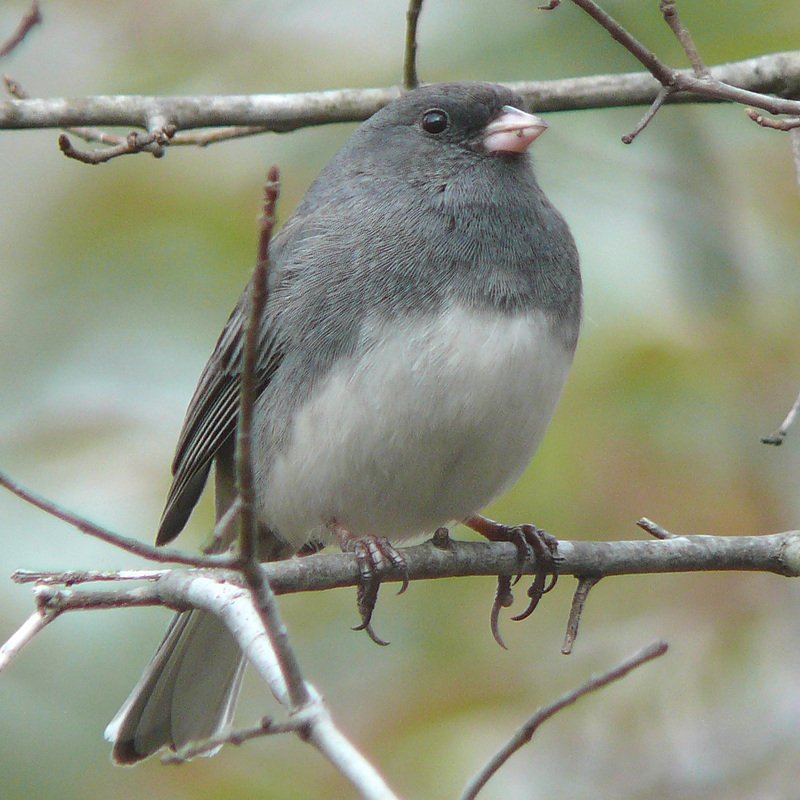|
| Query: american tree sparrow | Result: 23rd of 30 | |
Dark-eyed Junco (Junco hyemalis) - wiki
| Subject: | Dark-eyed Junco (Junco hyemalis) - wiki
| |

| Resolution: 1200x1200
File Size: 524653 Bytes
Upload Date: 2007:08:27 22:30:38
|
Dark-eyed Junco
From Wikipedia, the free encyclopedia
[Photo] A Dark-eyed Junco subspecies - the Slate-colored Junco (Junco hyemalis hyemalis). Photo taken with a Panasonic Lumix DMC-FZ50 in Johnston County, North Carolina, USA. Date 5:22 p.m. EDT, 22 March 2007. Author Ken Thomas www.kenthomas.us
The Dark-eyed Junco, (Junco hyemalis), is the best-known species of junco, a genus of small American sparrows.
Adults are generally grey on top with a white belly. The white outer tail feathers flash distinctively in flight. The bill is usually pinkish. The males tend to have darker, more conspicuous markings than the female. Juveniles often have pale streaks and may even be mistaken for a Vesper Sparrow until they acquire adult plumage at 2 to 3 months. There are several regional variations:
The Slate-colored Junco (Junco hyemalis hyemalis) has a dark slate-grey head, breast and upper parts. Females are brownish grey. It is found in North America in taiga forests from Alaska to Newfoundland and south to the Appalachian Mountains, wintering further south; it is relatively common in its range.
The White-winged Junco (Junco hyemalis aikeni) has a pale gray head, breast, and upperparts with white wing bars. Females are washed brownish. It is an endemic breeder in the Black Hills area of South Dakota, Wyoming, Nebraska, and Montana. It is common across its breeding range.
The Oregon Junco (Junco hyemalis oreganus) is found on the Pacific coast mountains from southeastern Alaska to extreme northern Baja California. It has a blackish-gray head and breast with a brown back and wings and reddish flanks. This is the most common form in the west.
The Pink-sided Junco (Junco hyemalis mearnsi) has a grey head and breast, with a brown back and wings. It has pinkish-brown flanks. It is found in the northern Rocky Mountains from southern Alberta, Canada to Idaho and Wyoming in the northern United States.
The Gray-headed Junco (Junco hyemalis caniceps) is found in the southern Rocky Mountains from Colorado to central Arizona. It is mainly grey on with a rusty back.
The Red-backed Junco (Junco hyemalis dorsalis) is found in the southern mountains of Arizona and New Mexico. It differs from "Gray-headed" Junco in having a dark upper mandible, a variable amount of rust on the wings, and pale underparts. This makes it similar to the Yellow-eyed Junco except for the dark eye. It does not overlap with Yellow-eyed Junco in breeding range.
Their breeding habitat is coniferous or mixed forest areas throughout North America. They usually nest in a cup shaped depression on the ground, well hidden by vegetation or other material, although they are sometimes found in the lower branches of a shrub or tree. The nests have an outer diameter of about 10cm and are lined with fine grasses and hair.
Normally two broods of 4 eggs are laid during the breeding season. They are incubated by the female for 12 to 13 days. The slightly glossy egg shells are greyish or pale bluish-white in color and heavily spotted (sometimes splotched) with various shades of brown, purple or grey. The spotting is concentrated at the large end of the egg. Young leave nest between 11 and 14 days of hatching.
Northern birds migrate further south; many populations are permanent residents or altitudinal migrants. In winter, juncos are familiar in and around towns. The Slate-coloured Junco is a rare vagrant to western Europe and has wintered in Great Britain, usually in a domestic garden.
These birds forage on the ground. In winter, they often forage in flocks that may comprise several races. They mainly eat insects and seeds. The song is a trill similar to the Chipping Sparrow's, except that the Red-backed's song is more complex, similar to the Yellow-eyed Junco's. Calls include "tick" sounds and very high-pitched tinkling chips.
http://en.wikipedia.org/wiki/Dark-eyed_Junco
| The text in this page is based on the copyrighted Wikipedia article shown in above URL. It is used under the GNU Free Documentation License. You may redistribute it, verbatim or modified, providing that you comply with the terms of the GFDL. |
|
Comments |
|---|
| | ebony washington |
|
| mmmmmmmmmmmaaaaaaaaaaaaaaan that pic is the bomb!!!!!!!!!!!!!!!!!!!!!!!!!!!!!!!!!!!!!!!!!!!!!!!!!!!!!!!!!!!!!!!!!!!!!!!!!!!!!!!!!!!!!!!!!!!!!!!!!!!!!!!!!! |

|

|

|
american tree sparrow
23/30 |

|
 |
^o^
Animal Pictures Archive for smart phones
^o^
|
|
|